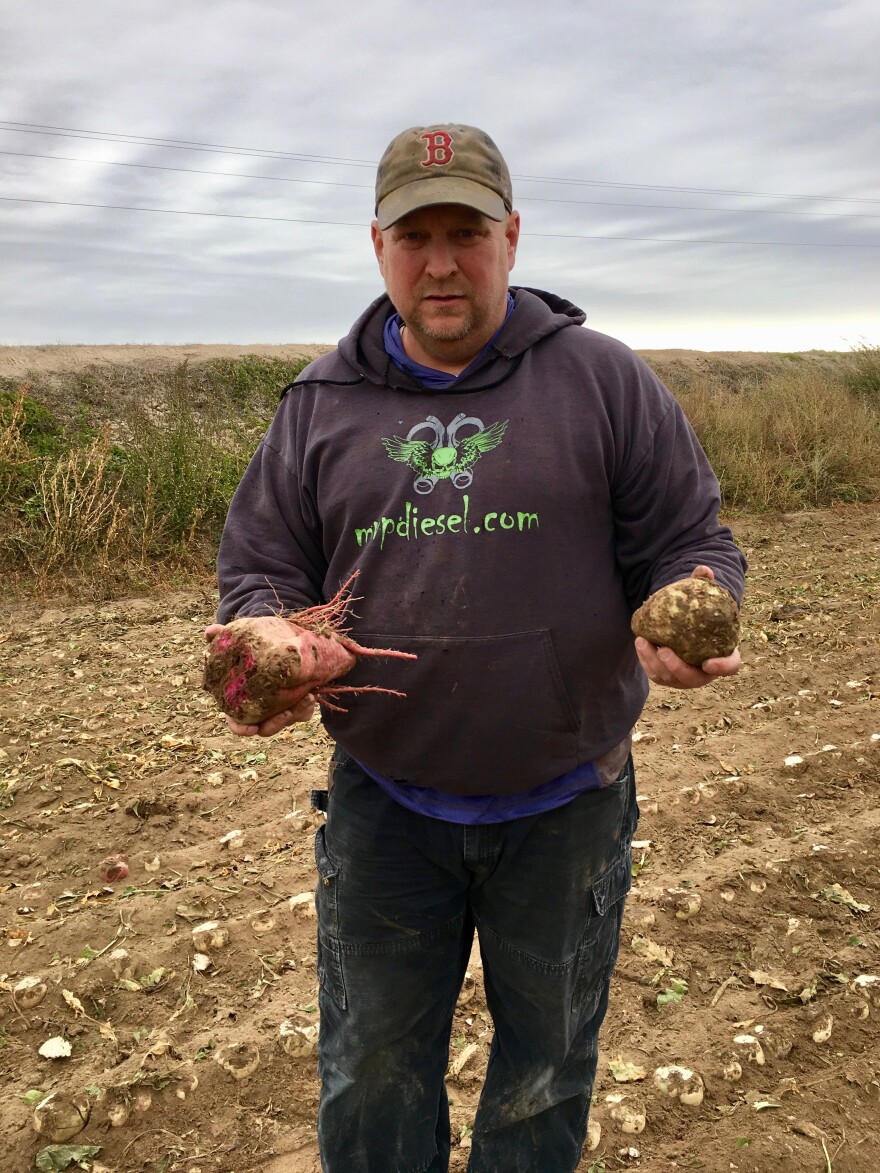Randy Grant pulled his white pickup right onto his sugar beet fields to examine the harvest.
“I'll drive us around out here, try not to get us run over," he said. "There’s a lot going on in one of these harvests.”
A couple of tractors were making their way down rows, tossing the white, long, turnip-like vegetables into the beds of trucks riding alongside them.
Seagulls swooped in behind the tractors, fighting to pick up worms dug up from deep in the dirt.
Grant farms 1,200 acres of sugar beets, along with some other crops, with his business partner. They sell the beets to the processing co-op, Amalgamated Sugar.
He says unusually cold weather earlier in October that gave trouble to some potato farmers in east Idaho affected the sugar beets for a couple days.
“You can see the color of the sugar beets -- they’re usually a darker, more lively green. Now they’re kind of yellow. It basically stopped the growing of them for the year," Grant said.
Cold weather can alter the sugar content of these root vegetables. But they won’t know how the dip in temperatures affected the beets until they are processed. Despite the cold snap, sugar beet farmers are right on schedule to wrap up harvest in the next week. Beets, Grant said, are hardy.
“Year in, year out a stable crop," he said. "They don't quite have the fluctuations that some of the other ones do — the highs and the lows.”
The beets in these fields were planted in April and harvested in September and October. Through the winter, they sit in storage. Then they’re processed in the Amalgamated Sugar factories through early spring, showing up in bags of granulated sugar, cereals and sports drinks.
For the last 10 or so years, seed companies have offered farmers genetically modified seeds for sugar beets and Grant said this technology has improved output. Harvest used to be messier — they would have to pick out the bad beets by hand. Now, a lot of the work is people coordination.
Jamie Gilchrest is a farm hand. Each day during the harvest, he rides one of the tractors down the field, picking up beets. The digger attached to the back spins the beets up from the ground, lifting them up a ladder, where they shoot out the top and into the bed of the truck riding alongside.

After the digger tops off a truck, it pulls away toward the road, heading to the dumping site five miles away. Then, another truck pulls up in its place. The driver and Gilchrest lock eyes so they know they’re in sync.
“It's a lot of coordination," said Gilchrest.
This process goes on all day from about seven in the morning to eight in the evening.
“If we can get 300 loads a day, we’re happy campers," said Grant. That's 300 trucks full of sugar beets leaving the fields each day. Each of those loads holds 15 tons of beets.
Trucking is a bulk of the harvest work. And lately, with the low unemployment rate and a national trucking shortage, good employees can be difficult to come by.
“As the economy has strengthened, it’s been harder to find good — I mean you can find help, but you need to find good, competent help, especially if they’re driving on roads," Grant said. "It’s been somewhat of an issue, but we’ve been fortunate to have the same help come back year after year."
Lydia Perez fits that bill. She’s worked for Grant for about eight years, hauling beets.
“I’m going to haul beets over to the beet dump," Perez said, "and then I unload, and then we come back and load up again.”
At 11 a.m., it was Perez’s fourth trip to the dump of the day, where she let the beets roll into a giant mountain that takes shape by the road during harvest.
The sugar beet harvest is intense, around the clock work that lasts between one and two months. Lately, employers have seen a lot of retirees applying for trucking jobs, even if they’ve never worked in agriculture before. Seniors in the U.S. are working later and later into their lives. And the beet harvest is a way to make some money in a short time.

Perez says while people can hop right in during harvest, the job requires care and attention.
“The harvest time is pretty dangerous," she said. "You kind of got to be on your toes. Eyes open, ears open. I drive so I want to be very careful and watch out for other drivers because they come out from everywhere.”
After dumping her beets, Perez heads back to the fields. She finds a harvester to ride beside, and waits as they fill up her truck for the fifth load. Next week, the harvest will be over. She’ll help out with some odd jobs and then will be done for the winter. Until next spring, when she’ll come back out for planting.
Find reporter Rachel Cohen on Twitter @racheld_cohen
Copyright 2019 Boise State Public Radio




